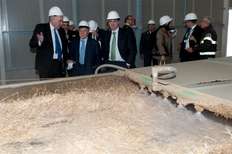- The plant uses wheat straw, rice straw, and arundo donax to produce bioethanol.
- Lignin extracted during production powers the facility and sells excess electricity to the grid.
- Over $200 million has been invested in the technology since 2011.
- A Bloomberg study suggests advanced biofuels could create millions of jobs by 2030.

Facility Overview
Beta Renewables and Novozymes have opened the world’s largest advanced biofuels facility in Crescentino, Italy. This plant is the first to produce bioethanol from agricultural residues and energy crops at a commercial scale using enzymatic conversion.
Technological Advancements
The facility uses wheat straw, rice straw, and arundo donax, a high-yielding energy crop. Lignin, a polymer extracted during ethanol production, powers the facility, with excess electricity sold to the local grid. The plant showcases the potential of cellulosic ethanol for large-scale commercialization.
Investment and Development
Since 2011, over $200 million has been invested in developing the technology used at the Crescentino facility. Beta Renewables’ PROESA™ technology and Novozymes’ Cellic® enzymes form the most cost-competitive advanced biofuels platform available today.
Policy and Economic Impact
Stable and conducive policy conditions are essential for the growth of the advanced biofuels market. Clear signals from policymakers, such as blending mandates and investment support, are needed to encourage further investments. A Bloomberg New Energy Finance study indicates that transforming agricultural residues into advanced biofuels could create millions of jobs, stimulate economic growth, reduce greenhouse gas emissions, and enhance energy security by 2030.

